
Your Best Dental Experience Here
Services
Smile Designing/ Makeovers

Your smile says a lot about you.
It lets people know whether you're happy or sad. Whether you're talkative or shy. If you feel comfortable in your own skin.
Yes, people can tell a lot from a smile. So what is your smile saying about you?
A smile makeover is a way to invest in yourself by investing in your smile. It improves your smile by whitening, brightening, and straightening your teeth. Why not invest in your smile!?
So what does a smile makeover involve? We'll show you right here.
Do You Need a Smile Makeover?
There are varying degrees of dental work necessary to make your smile the best it can be. And every set of teeth is different. Let's take a look at some of the aspects of a beautiful smile.
Spacing and Alignment
How are your teeth aligned? Good alignment means having teeth that are straight and follow each other naturally. If you had braces as a child, you might have pretty straight teeth.
But if not, you may have crooked teeth or teeth that are set back from the rest. The same goes for spacing. You may have gaps between teeth that didn't fill in when you were a child.
Missing and Chipped Teeth
Chipped teeth can be embarrassing, especially if they're in the front of your mouth. They can also lead to more serious issues like cavities. Chips leave your teeth vulnerable to substances that can break them down or cause pain in the root.
Missing teeth affect your smile. But they also affect the way the rest of your teeth sit in your mouth.
When you lose a tooth, space opens up for the other teeth to move around. This causes issues with the spacing and alignment of the rest of your mouth.
If you're missing a tooth, it also affects how the teeth come together when you bite down. This may not be an issue at first, but as time goes on, it can cause lots of problems. Headaches, cracked teeth, and jaw pain are all issues that can come from a misaligned bite
Color
One of the most obvious smile issues is the color of your teeth. Fortunately, this is also one of the easiest things to fix. Coffee, wine, and other acidic foods attack the enamel and leave stains behind.
Length and Proportion
The size of your teeth makes a difference. Are your teeth proportioned to your mouth and to each other?
Many people have one or two teeth that are smaller than the others, making the mouth look lopsided. And if your teeth are abnormally long or short, that can cause a problem too.
The Elements of the Smile Makeover
A smile makeover is different for every patient. And you may not have all the issues discussed in the section above. That's why a great cosmetic dentist can tailor your smile makeover to address the issues that bother you.
Here's a look at services that Broadway Cosmetic Dentistry offers to get your smile back on track.
Whitening
For many people, it's as simple as a good, professional whitening job. Dentists are able to use stronger, and more effective methods to whiten than you'd get over-the-counter.
The key to good whitening is not to go too white. But to create a natural and pleasing color for your teeth. At Broadway, we can whiten your teeth in one sitting.
Bonding
If you have chipped teeth, bonding is a great way to save the tooth and make it look whole again. The dentist uses a super strong resin to recreate the missing enamel.
The resin creates a firm bond with your tooth so it's stable and safe. And it's color matched so that it blends right in with the rest of your teeth.
Invisalign
Problems with alignment used to mean you wore wire braces for several years. And braces are sometimes necessary if you have severe issues with teeth placement. But usually, a set of Invisalign trays does the trick.
Each set of trays is specially-made to fit your teeth. They are nearly invisible, making them more discrete than braces. And they're more comfortable than bulky, wire braces.
Plus, with Invisalign, you can take them out to eat and clean your teeth. And they often work faster than braces. Invisalign usually corrects teeth alignment in about 12 months or half the time of braces.
Veneers
Dental veneers can correct almost any tooth problem you've got. Like other methods, veneers are custom-made for your teeth. The dentist makes veneers from a very thin, strong layer of porcelain.
The porcelain sits over the front of your existing teeth and the dentist bonds it into place. Veneers can reshape a tooth that's too small or too large. And can cover up chipped or worn down teeth.
Implants
If you have one or more missing teeth, dental implants are the way to go. With an implant, the dentist places a titanium post into your jaw where the root of the missing tooth was. On top of the post, they bond a custom-made crown.
Implants work for more than one tooth too. If you have several teeth in a row, they can all bond right to one implant. And they can even replace dentures
Are You Ready to Revamp Your Smile?
One of the best investments you can make is in your smile. A smile makeover improves the look and feel of your teeth to give you the confidence boost you've been missing.
Make your teeth whiter and brighter with professional whitening. Bonding fixes chipped or broken teeth while saving the root and pulp of the tooth. And Invisalign trays can make your teeth as straight as an arrow.
Dental Implants & Prosthesis

There are many practical and esthetic reasons to replace a tooth or teeth. Sometimes people lose one or more permanent teeth, and it can be uncomfortable and upsetting. Missing teeth can be replaced with:
Implants
Crowns
Bridges
Partial dentures
Complete Dentures
Dental Implants have been used successfully for several decades, and dentists now rely on them to solve problems that were formerly unsolvable. Dental implants are teeth that can look, feel, and function just like your own. In simplest terms, an implant involves threading a titanium screw into the bone and attaching a prosthetic tooth to it.
Implants are made of a titanium alloy. The first step involves placing a sterile implant into the bone which will fuse to the implant in a process known as “osseointegration.” Once this process is successfully completed the prosthetic tooth can be placed overtop.
Dental implants are so natural in the way they look and feel, you may forget you ever lost a tooth. Dental implants can be placed without compromising any other teeth. Maybe your dentures don’t feel secure, and you have difficulty chewing or eating? Implants can help.
Implants are helpful if you are missing one or more teeth and would like to smile, speak and eat again with more comfort and confidence. Under proper conditions, and diligent patient maintenance, implants can last a lifetime.
Make an AppointmentOrthodontic Treatment/ Invisalign
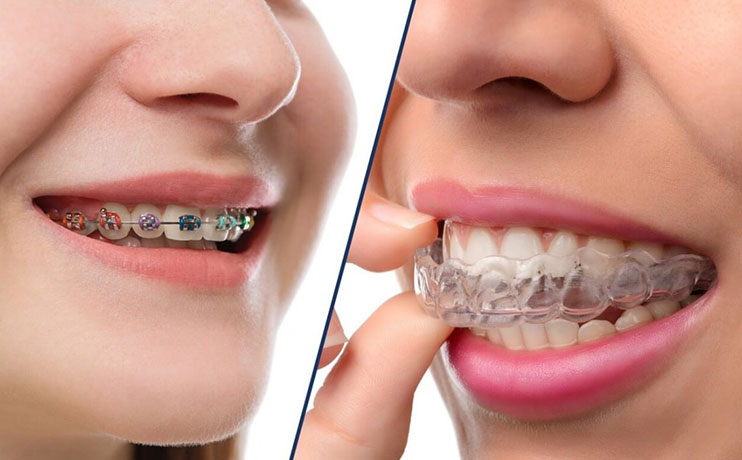
Orthodontic treatment is a way of straightening or moving teeth, to improve the appearance of the teeth and how they work. It can also help to look after the long-term health of your teeth, gums and jaw joints, by spreading the biting pressure over all your teeth.
Many people have crowded or crooked teeth. Orthodontic treatment will straighten the teeth or move them into a better position. This can improve their appearance and the way the teeth bite together, while also making them easier to clean.
Some people have upper front teeth that stick out and look unsightly. These 'prominent' teeth are more likely to be damaged, but orthodontic treatment can move them back into line. Or the way the upper and lower jaws meet can cause teeth to look unsightly and lead to an incorrect bite. Orthodontic treatment may be able to correct both of these problems.
When the teeth don't meet correctly, this can put strain on the muscles of the jaw, causing jaw and joint problems and sometimes headaches. Orthodontic treatment can help you to bite more evenly and reduce the strain.
Make an AppointmentTreatment For Temporomandibular Disorders (Tmd’s)
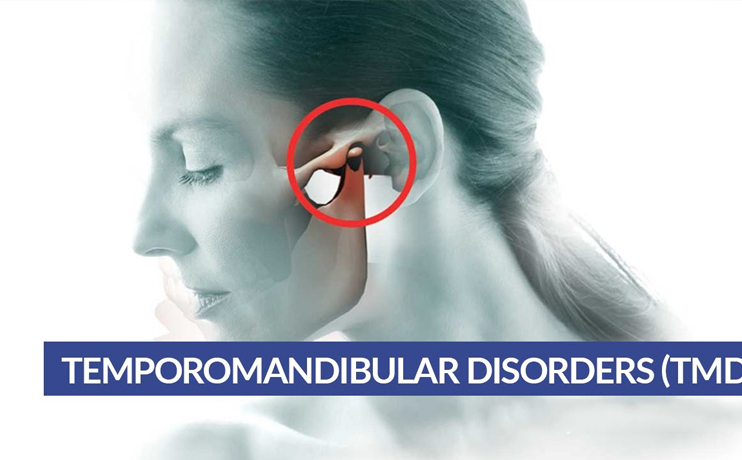
The temporomandibular joint (TMJ) is the name of the joint located on either side of your head, just in front of your ears. These joints connect your mandible (jawbone) to your temporal bone (skull). The TMJ, which can rotate and move forward, backward and side to side, is considered one of the most complex joints in the body. This joint, in combination with other muscles and ligaments, lets you chew, swallow, speak and yawn. When you have a problem with the muscle, bone or other tissue in the area in and around the TMJ, you may have a TMD.Symptoms of TMDs
Signs or symptoms of TMDs include pain and tenderness in or around the ear, the jaw joint, or the muscles of the jaw, face or temples. Other symptoms are problems opening or closing your mouth, and a clicking, popping, crunching or grinding noise when you chew, yawn or open your mouth. TMDs may be linked with neck pain and headaches. If you have any of these symptoms, tell your dentist and your doctor.
Cause and Effect
In most cases, TMDs are caused by a combination of factors like jaw injuries and joint disease, such as arthritis. It is believed that bruxism (tooth clenching or grinding) and head or neck muscle tension may make TMD symptoms worse. Stress is also a possible factor. However, it is not clear if stress causes TMDs or is a result of them.
Other things that may lead to TMDs are partial or full dentures that are not the right fit and certain habits such as fingernail biting and pen or pencil biting.
Treating TMDs
Most patients with TMDs get better by themselves without any treatment. To help ease sore jaw muscles, place a cold or warm compress to your jaw and gently massage your jaw muscles. Eat a soft diet, cut food into small pieces and avoid hard, chewy or sticky foods. Try not to open your mouth too wide, even when you yawn. And most importantly, relax your jaw muscles.
When you are relaxed, your teeth should be slightly apart and your tongue should rest on the floor of your mouth with your lips barely touching or slightly apart. There should be a slight space between your upper and lower teeth except during chewing, speaking or swallowing
Make an AppointmentRoot Canal Treatment
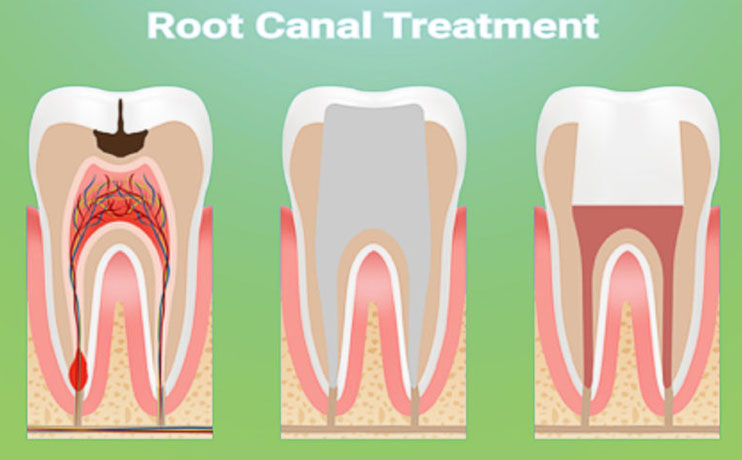
Root canal treatment is an often straightforward procedure to relieve dental pain and save your teeth. Patients typically need a root canal when there is inflammation or infection in the roots of a tooth. During root canal treatment, an endodontist who specializes in such treatment carefully removes the pulp inside the tooth, cleans, disinfects and shapes the root canals, and places a filling to seal the space.
Root canal treatment is necessary when the pulp, the soft tissue inside the root canal, becomes inflamed or infected. There are a whole host of reasons why you might need root canal treatment:
1. Deep decay
2. Repeated dental procedures on the tooth
3. Faulty crown
4. Crack or chip in the tooth
In addition, an injury to a tooth may cause pulp damage even if the tooth has no visible chips or cracks. If pulp inflammation or infection is left untreated, it can cause pain or lead to an abscess.
There are many clinical reasons for needing root canal treatment, but there are also countless practical reasons why saving the natural tooth is a wise choice. Endodontic treatment helps you maintain your natural smile, continue eating the foods you love and limits the need for ongoing dental work. With proper care, most teeth that have had root canal treatment can last a lifetime.
Make an AppointmentRestorations (Crowns/ caps & Bridges)
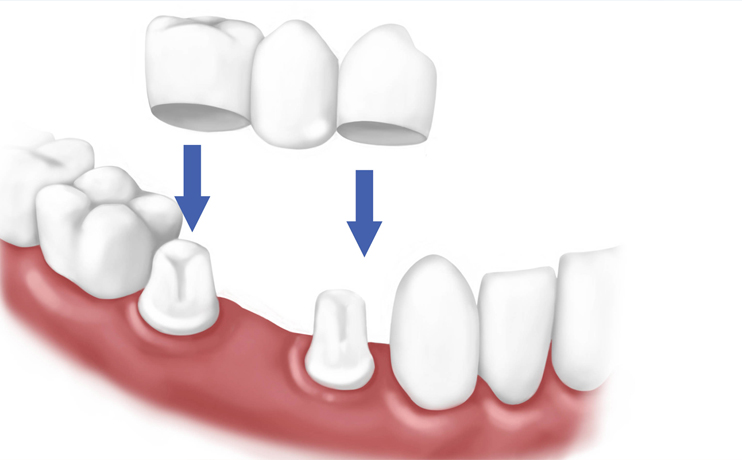
What are Crowns and Bridges?
Dental crowns and most bridges are fixed prosthetic devices. Our dentists cement them onto existing teeth or implants, and if replacements are required, only a dentist can remove them. This characteristic distinguishes them from dentures and other removable options like dentures, which must be removed and cleaned daily.
A dental crown covers or caps a damaged tooth to provide it with additional strength. We may also place one to improve the alignment or appearance of the damaged tooth. Finally, dentists may place a dental crown on an implant to provide the implant with a more functional shape and structure.
In contrast, we recommend a bridge if you’re missing one or more teeth. Gaps left by missing teeth eventually cause a bad bite, since the remaining teeth rotate or shift into empty spaces. The imbalance can also lead to gum disease and temporomandibular joint (TMJ) disorders.
What Can a Crown or Bridge Fix?
We generally recommend bridges when you lose one or more tooth in its entirety. In contrast, we usually recommend a dental crown for one of the following reasons:
1. Restoring a cracked or fractured tooth
2. Replacing a large filling
3. Covering an implant
4. Strengthening a tooth that has had a root canal
What Are the Benefits of Crowns and Bridges?
The main advantage to getting any restoration is that it helps maintain good oral health. A fractured tooth can eventually break completely, necessitating further treatments. Restorations help prevent that. Additionally, restorations restore good aesthetics to your smile.
Make an AppointmentPediatric/ kid’s Dentistry

What is a Pediatric Dentist?
Pediatric dentists are dedicated to the oral health of children from infancy through the teen years. They have the experience and qualifications to care for a child’s teeth, gums, and mouth throughout the various stages of childhood.
Children begin to get their baby teeth during the first 6 months of life. By age 6 or 7 years, they start to lose their first set of teeth, which eventually are replaced by secondary, permanent teeth. Without proper dental care, children face possible oral decay and disease that can cause a lifetime of pain and complications. Today, early childhood dental caries—an infectious disease—is 5 times more common in children than asthma and 7 times more common than hay fever.
Pediatric Dentists — The Best Care For Children Children are not just small adults. They are not always able to be patient and cooperative during a dental exam. Pediatric dentists know how to examine and treat children in ways that make them comfortable. In addition, pediatric dentists use specially designed equipment in offices that are arranged and decorated with children in mind.
A pediatric dentist offers a wide range of treatment options, as well as expertise and training to care for your child’s teeth, gums, and mouth. When your pediatrician suggests that your child receive a dental exam, you can be assured that a pediatric dentist will provide the best possible care.
Make an AppointmentDentures

Dentures are removable appliances that can replace missing teeth and help restore your smile. If you’ve lost all of your natural teeth, whether from gum disease, tooth decay or injury, replacing missing teeth will benefit your appearance and your health. That’s because dentures make it easier to eat and speak better than you could without teeth—things that people often take for granted.
When you lose all of your teeth, facial muscles can sag, making you look older. Dentures can help fill out the appearance of your face and profile. They can be made to closely resemble your natural teeth so that your appearance does not change much. Dentures may even improve the look of your smile.
Make an AppointmentOral Surgery And Extractions

Oral Surgery defines any surgical procedure performed in or around the mouth. The most common form of oral surgery is called a tooth extraction, in which one or more teeth are removed from the mouth.
Some other common forms of oral surgery include:
1. Wisdom Teeth Extraction
2. Dental Implants (from Single to Full-Arch Cases)
3. Bone Grafting
4. Dental Anesthesia Services (Sedation)
Generally, oral surgery is performed when an oral condition becomes too severe for treatment by less invasive procedures. Your dentist will provide a detailed treatment plan for any dental surgery to make sure that you feel informed and comfortable with your options.
Tooth Extraction
There are many reasons your dentist may choose to extract one or more of your teeth. Most tooth extractions are a result of severely damaged teeth or an overcrowded mouth with misaligned teeth; wisdom tooth extractions also account for a large portion of all tooth extractions.
You may require a tooth extraction if you:
1. Have impacted teeth, or teeth that are growing in on top of each other
2. Have large teeth or a small mouth, with little room for teeth to fit comfortably
3. Develop any foreseeable issues with your wisdom teeth
4. Have severely damaged, rotted, or loose teeth
The tooth extraction procedure begins with your dentist applying a local anesthetic to the gums around the targeted tooth. If your tooth is deeply rooted or partially under your gums, your dentist may then apply a stronger anesthetic in the form of a shot, or a general anesthetic through an IV. Your dentist will then pull the tooth out, or break parts of the tooth, to extract it.
Make an AppointmentPreventive Dental Care
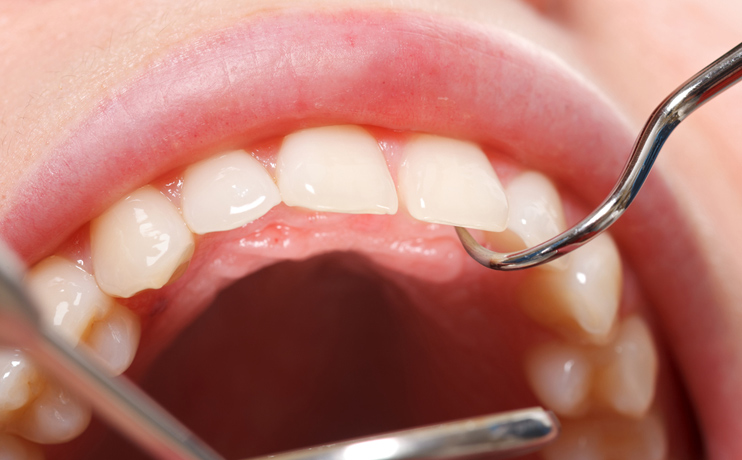
What Is Preventive Dentistry?
Preventive dentistry is the practice of caring for your teeth to keep them healthy. This helps to avoid cavities, gum disease, enamel wear, and more.
There are many forms of preventive dentistry, such as daily brushing and dental cleanings. To maintain optimal oral health, the American Dental Association (ADA) recommends visits to the dentist at regular intervals determined by a dentist. These practices are designed to ensure that teeth are clean, strong, and white. Children should be taught proper oral hygiene at an early age.
Keep reading to learn more about the steps you can take to keep your teeth healthy
What Are the Benefits of Preventive Dentistry?
With good dental hygiene, you can greatly reduce your risk of getting cavities, gingivitis, periodontitis, and other dental problems. This, in turn, can reduce your risk of secondary problems caused by poor oral health. Some health problems that may be linked to poor oral health are:
1. Diabetes
2. Heart Disease
3. Osteoporosis
4. Respiratory Disease
5. Cancer
Premature birth and low birth weight may also be linked to poor oral health. You should continue to practice or adopt good preventive oral health if you’re pregnant. This includes visiting your dentist for routine checkups during your pregnancy.
In addition to reducing your risk for other health issues, practicing good preventive health can save you money. Even with dental insurance, the costs associated with poor oral hygiene can add up. While preventive dentistry may not completely eliminate your need for fillings, root canals, or dental implants, it can go a long way in reducing your need for these costly treatments
Make an Appointment
Make your dream smile a reality! Call us at: +91 9372030196
Professional Dentists Expert with Modern Technology, We strive to provide the highest quality dental treatment
Contact us